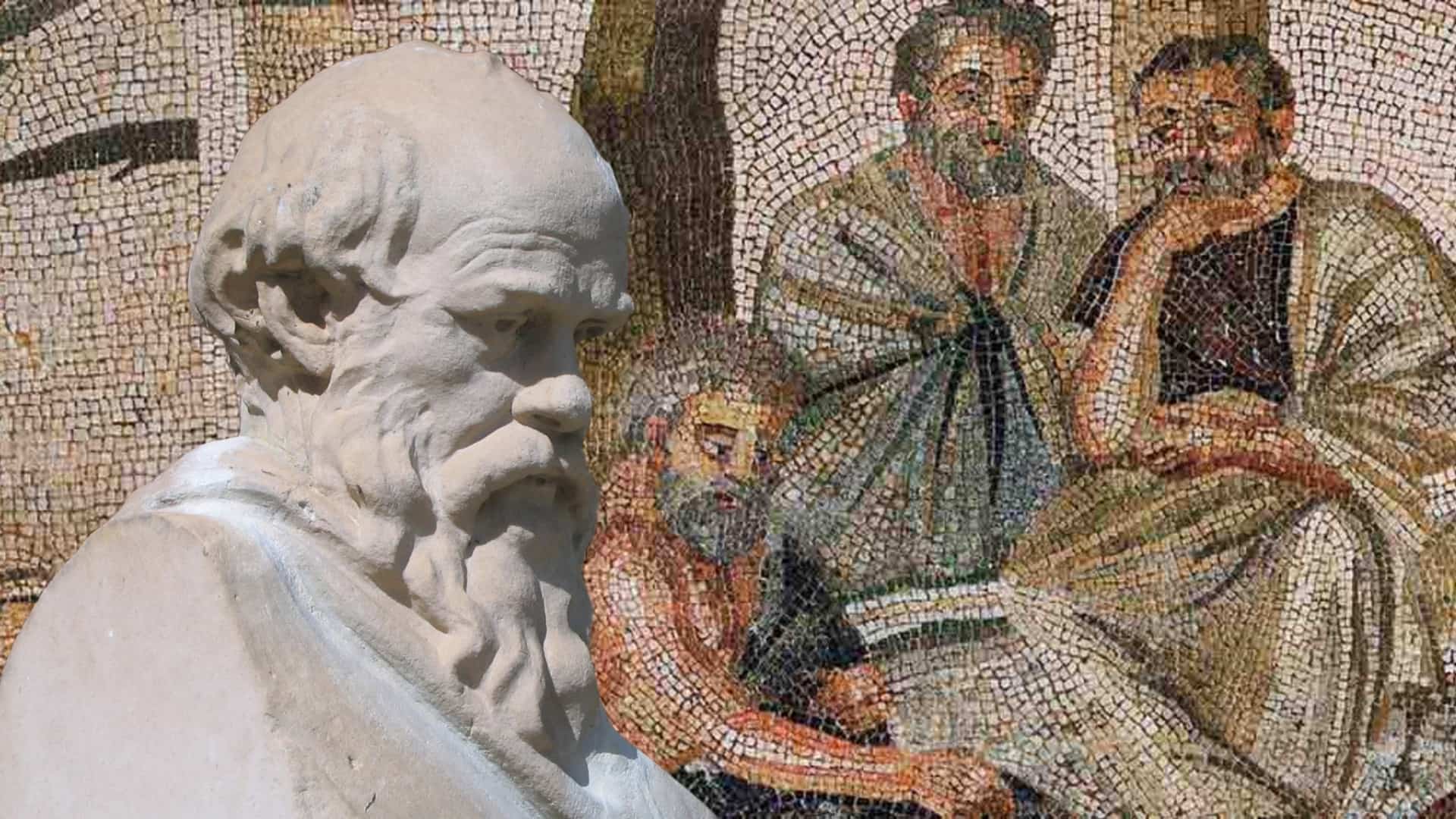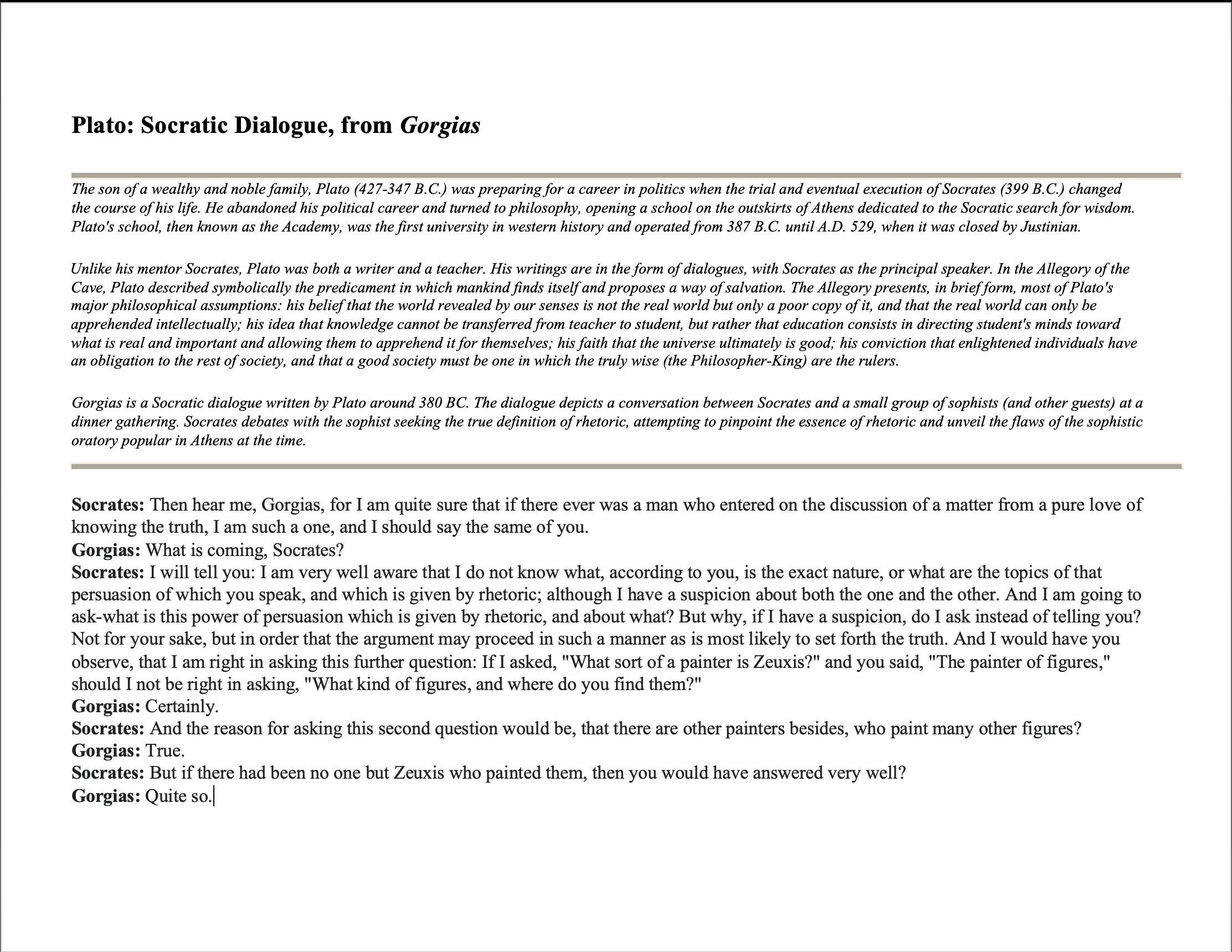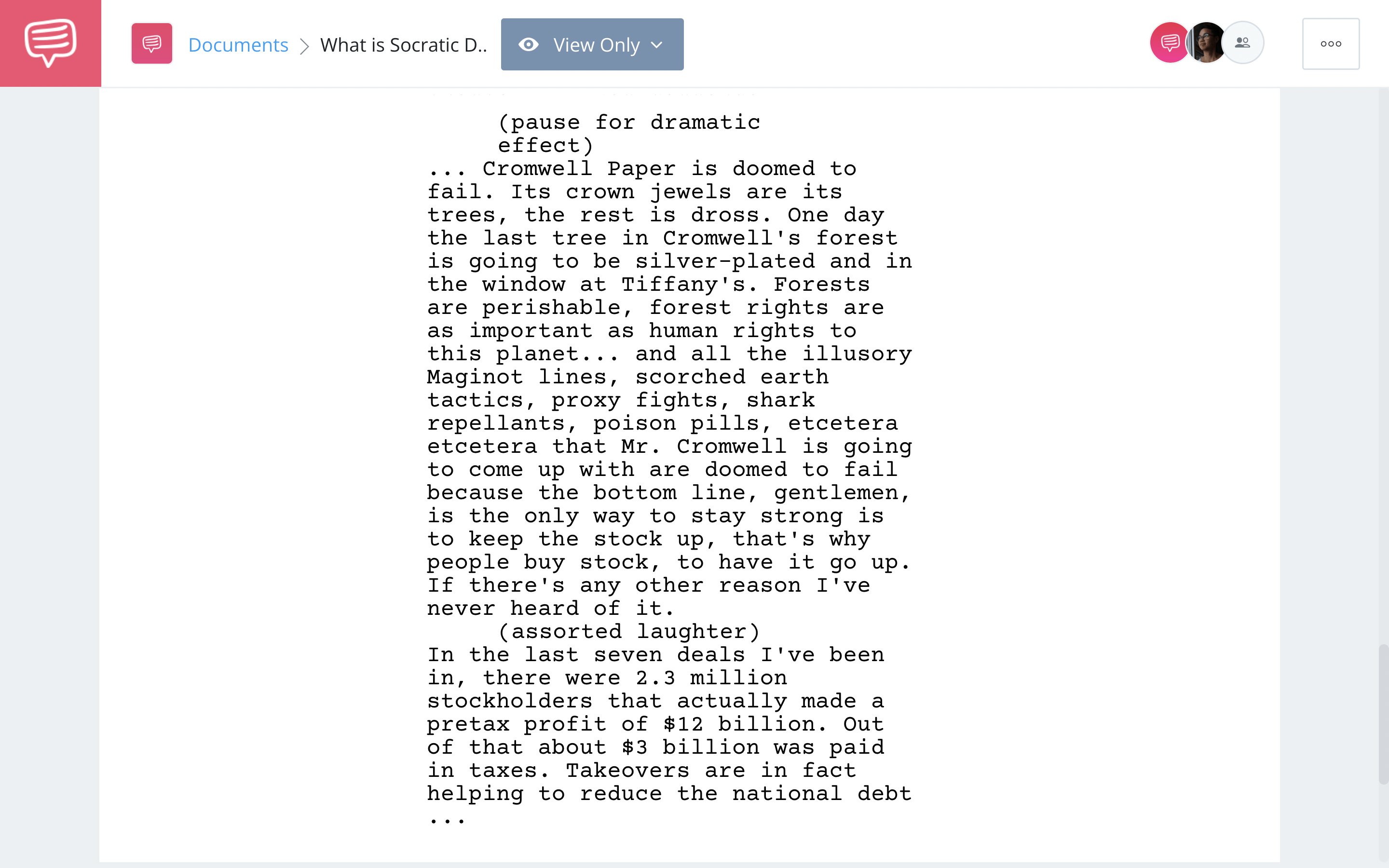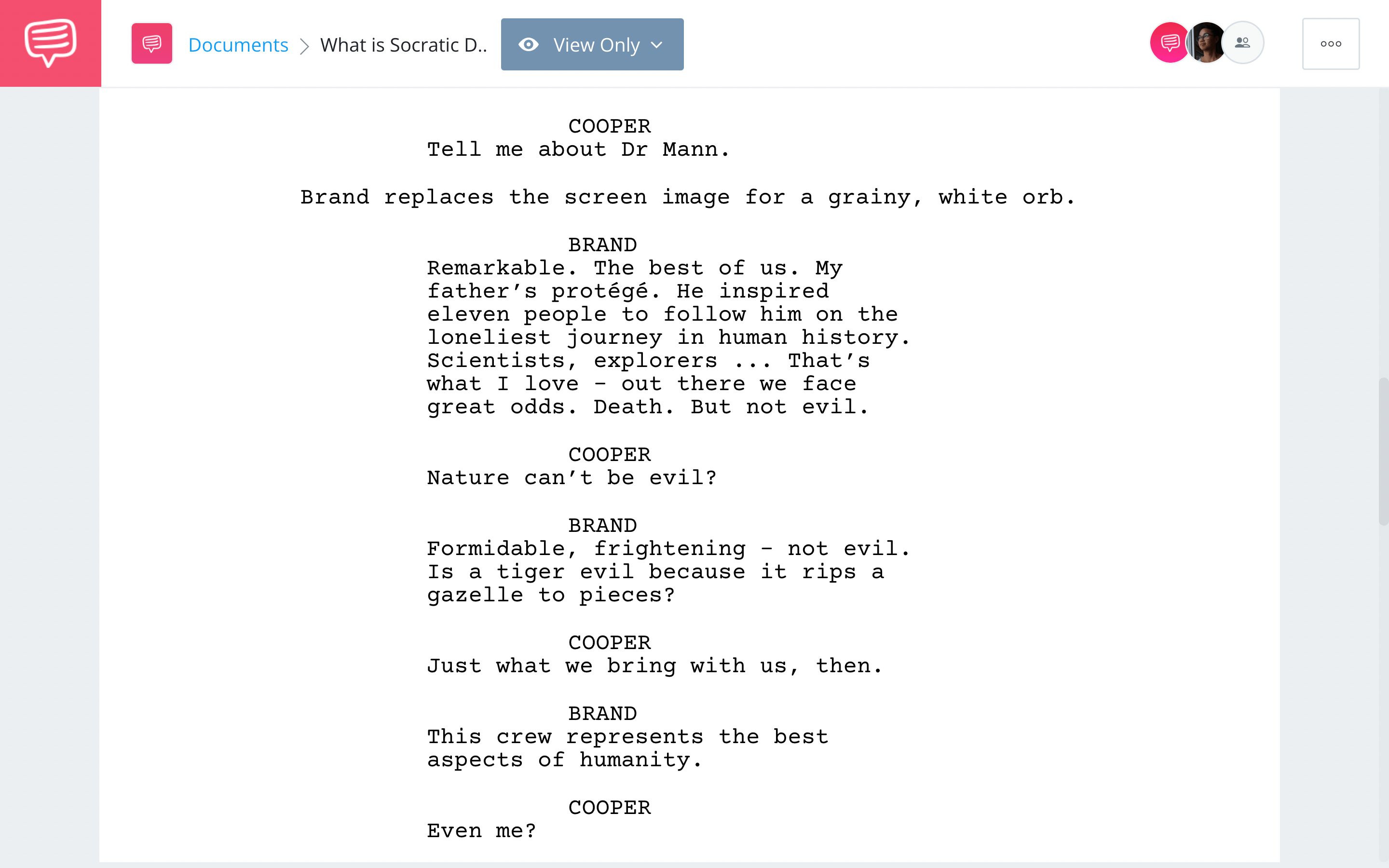A Socratic dialogue is an excellent vehicle for individuals to explore the epistemological nature of ideas. But what is Socratic dialogue? And why is it an excellent vehicle for exploring epistemology? We’re going to answer those questions by defining Socratic dialogue; then we’ll break down some Socratic dialogue examples. By the end, you’ll know how to recognize and implement this techniue in your writing and everyday life.
SOCRATIC DIALOGUE DEFINITION
What is Socratic Dialogue?
A Socratic dialogue is a conversation between two or more people in which participants are forced to think critically, yet independently about the dialectical and epistemological nature of a subject matter. The “Socratic dialogue” was utilized by the Athenian philosopher Plato to advance arguments involving logic and reason.
How Socratic Dialogue is Used To—
- Deconstruct rhetoric
- Guide others towards conclusions
- Pursue the ultimate truth of ideas
Define Socratic Dialogue
Background on Socratic Dialogue
Many people assume that “Socratic dialogue” is named after the great Greek philosopher Socrates… and it is – but only partly! The term was named after Socrates, but was developed by Plato.
In Plato’s Socratic dialogues, Socrates serves the role of the protagonist, egging on students (and experts) to examine essential questions regarding the theory of knowledge. This next video breaks down the philosophy behind socratic dialogue in further detail.
Dialogue of Socrates • A Lesson From Socrates That Will Change the Way You Think by Robot Banana
Asking questions is at the heart of Socratic dialogues. But what kind of questions need to be asked? For an answer to that question, we’ll look at some classic examples.
Socratic Dialogue Meaning
Classic Socratic dialogue examples
Ancient Athens was a place of burgeoning arts and intellect; one in which athletes, mathematicians, politicians, and others gathered in the public square to listen to the teachings of philosophers like Socrates.
However, philosophers like Socrates were a dime a dozen. Instead, most intellectual discourse took place in private in the form of rhetoric (persuasive argumentation).
Sophists – or Ancient Greek teachers – charged exorbitant rates to nobility to share their expertise on subjects ranging from rhetoric to music.
Sophists widely preached skepticism, which Socrates refuted. This excerpt – taken from Plato’s Gorgias, translated by Benjamin Jowett – is one of the most famous Socratic dialogue examples from the Athenian era.
Plato’s Socratic Dialogue PDF Download
Click to view and download the entire Plato's Socratic Dialogue PDF below.
Click above to download Plato's Socratic Dialogue PDF
Here, Socrates questions the unique benefits of rhetoric. Slowly, he dismantles Gorgias’s rationale, thus disproving the unique benefits of rhetoric.
Related Posts
What is Socratic Dialogue Used For?
How to use Socratic dialogue in film
Some people believe that Socratic dialogue is a relic of the past – but that couldn’t be further from the truth. In reality, this technique plays an important part in media and everyday life.
Screenwriters use Socratic dialogue to question subject matter in their stories. This next video takes a look at how Quentin Tarantino used Socratic dialogue to reveal the beliefs of two central characters.
What is Socratic Dialogue Used for?
Socratic dialogue is a great way to indirectly characterize characters. So, let’s break down a couple examples!
First, you’re going to create a Socratic dialogue with Gordan Gekko of Wall Street. If you haven’t seen the movie, don’t worry! We imported the Wall Street screenplay into StudioBinder’s screenwriting software.
Just click the image below to read the excerpt.
Gordan Gekko’s Speech in Wall Street • Read Socratic Example in Wall Street
Let’s break down this scene in Socratic dialogue terms.
The argument: Gekko’s argument is that greed is good.
The premises: One: “Greed clarifies, cuts through, and captures the essence of the evolutionary spirit.” Two: “Greed in all its forms, greed for life, for money, for love, for knowledge, has marked the upward surge of mankind.”
Hidden Premise: The assertion that Greed “clarifies, cuts through, and captures the essence of the evolutionary spirit” and “greed in all its forms, greed for life, for money, for love, for knowledge, has marked the upward surge of mankind” proves that greed is good.
The conclusion: Gekko concludes that “Greed will save America.”
One could say that the goal of a Socratic dialogue is to examine the argument and premises with the intent of disproving the conclusion. So, let’s do just that:
Fictional Socratic Dialogue With Gordan Gekko from Wall Street PDF Download
Click to view and download the entire Fictional Socratic Dialogue With Gordan Gekko PDF below.
Click above to download Fictional Socratic Dialogue With Gordan Gekko PDF
Of course, the dialogue above is a fictional response to the character Gordan Gekko as presented in the original screenplay Wall Street, written by Stanley Weiser and Oliver Stone. In reality, Gekko probably wouldn’t admit flaws in his argument, no matter how foolproof they might be.
Here’s one more quick example of a Socratic dialogue from Christopher Nolan and Jonathan Nolan’s screenplay for Interstellar:
Socratic Dialogue Meaning • Read Socratic Dialogue Examples in Interstellar
In this example, Cooper and Brand have a simple Socratic dialogue about “nature” and “evil.” Brand suggests that nature is not inherently evil by positing “is a tiger evil because it rips a gazelle to pieces?” Cooper’s response implies agreement with Brand’s assertion. Of course, this Socratic dialogue could be further explored with a more thorough line of questioning.
Related Posts
Up Next
What is Socratic Irony?
Socratic dialogue is an important type of Socratic discourse – but it’s not the only one. Socratic irony is another type of Socratic discourse. In our next article, we break down the socratic irony definition with examples from A Few Good Men and The Office. By the end, you’ll know what Socratic irony is and how to recognize it.




